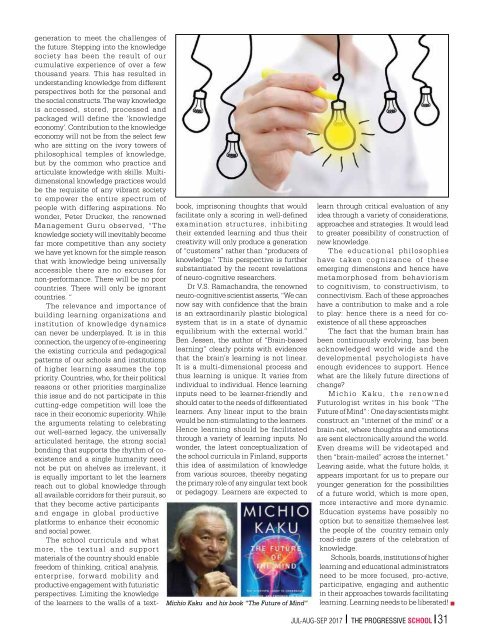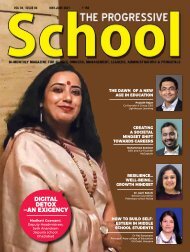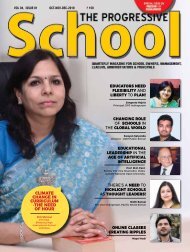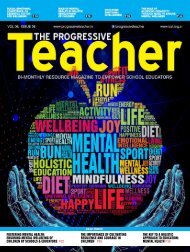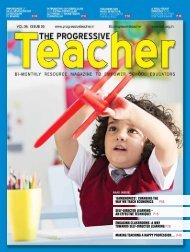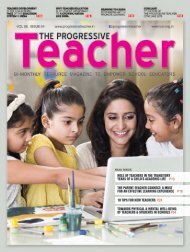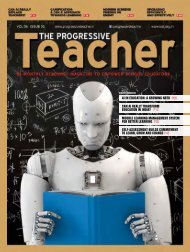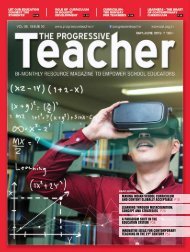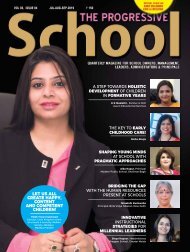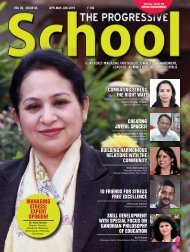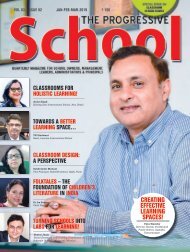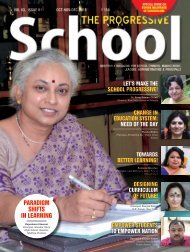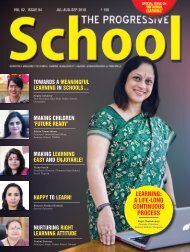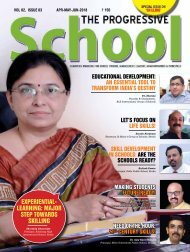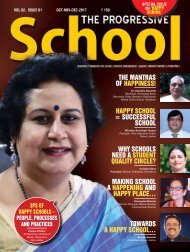The Progressive School Vol 01 Issue 04
The Progressive School is a quarterly magazine for school leaders, school owners, management, administrators and principals. It is set out to provide 'thought leadership' for progress and performance in schools.
The Progressive School is a quarterly magazine for school leaders, school owners, management, administrators and principals. It is set out to provide 'thought leadership' for progress and performance in schools.
You also want an ePaper? Increase the reach of your titles
YUMPU automatically turns print PDFs into web optimized ePapers that Google loves.
generation to meet the challenges of<br />
the future. Stepping into the knowledge<br />
society has been the result of our<br />
cumulative experience of over a few<br />
thousand years. This has resulted in<br />
understanding knowledge from different<br />
perspectives both for the personal and<br />
the social constructs. <strong>The</strong> way knowledge<br />
is accessed, stored, processed and<br />
packaged will define the ‘knowledge<br />
economy’. Contribution to the knowledge<br />
economy will not be from the select few<br />
who are sitting on the ivory towers of<br />
philosophical temples of knowledge,<br />
but by the common who practice and<br />
articulate knowledge with skills. Multidimensional<br />
knowledge practices would<br />
be the requisite of any vibrant society<br />
to empower the entire spectrum of<br />
people with differing aspirations. No<br />
wonder, Peter Drucker, the renowned<br />
Management Guru observed, “<strong>The</strong><br />
knowledge society will inevitably become<br />
far more competitive than any society<br />
we have yet known for the simple reason<br />
that with knowledge being universally<br />
accessible there are no excuses for<br />
non-performance. <strong>The</strong>re will be no poor<br />
countries. <strong>The</strong>re will only be ignorant<br />
countries. “<br />
<strong>The</strong> relevance and importance of<br />
building learning organizations and<br />
institution of knowledge dynamics<br />
can never be underplayed. It is in this<br />
connection, the urgency of re-engineering<br />
the existing curricula and pedagogical<br />
patterns of our schools and institutions<br />
of higher learning assumes the top<br />
priority. Countries, who, for their political<br />
reasons or other priorities marginalize<br />
this issue and do not participate in this<br />
cutting-edge competition will lose the<br />
race in their economic superiority. While<br />
the arguments relating to celebrating<br />
our well-earned legacy, the universally<br />
articulated heritage, the strong social<br />
bonding that supports the rhythm of coexistence<br />
and a single humanity need<br />
not be put on shelves as irrelevant, it<br />
is equally important to let the learners<br />
reach out to global knowledge through<br />
all available corridors for their pursuit, so<br />
that they become active participants<br />
and engage in global productive<br />
platforms to enhance their economic<br />
and social power.<br />
<strong>The</strong> school curricula and what<br />
more, the textual and support<br />
materials of the country should enable<br />
freedom of thinking, critical analysis,<br />
enterprise, forward mobility and<br />
productive engagement with futuristic<br />
perspectives. Limiting the knowledge<br />
of the learners to the walls of a textbook,<br />
imprisoning thoughts that would<br />
facilitate only a scoring in well-defined<br />
examination structures, inhibiting<br />
their extended learning and thus their<br />
creativity will only produce a generation<br />
of “customers” rather than “producers of<br />
knowledge.” This perspective is further<br />
substantiated by the recent revelations<br />
of neuro-cognitive researchers.<br />
Dr V.S. Ramachandra, the renowned<br />
neuro-cognitive scientist asserts, “We can<br />
now say with confidence that the brain<br />
is an extraordinarily plastic biological<br />
system that is in a state of dynamic<br />
equilibrium with the external world.”<br />
Ben Jessen, the author of “Brain-based<br />
learning” clearly points with evidences<br />
that the brain’s learning is not linear.<br />
It is a multi-dimensional process and<br />
thus learning is unique. It varies from<br />
individual to individual. Hence learning<br />
inputs need to be learner-friendly and<br />
should cater to the needs of differentiated<br />
learners. Any linear input to the brain<br />
would be non-stimulating to the learners.<br />
Hence learning should be facilitated<br />
through a variety of learning inputs. No<br />
wonder, the latest conceptualization of<br />
the school curricula in Finland, supports<br />
this idea of assimilation of knowledge<br />
from various sources, thereby negating<br />
the primary role of any singular text book<br />
or pedagogy. Learners are expected to<br />
Michio Kaku and his book “<strong>The</strong> Future of Mind”<br />
learn through critical evaluation of any<br />
idea through a variety of considerations,<br />
approaches and strategies. It would lead<br />
to greater possibility of construction of<br />
new knowledge.<br />
<strong>The</strong> educational philosophies<br />
have taken cognizance of these<br />
emerging dimensions and hence have<br />
metamorphosed from behaviorism<br />
to cognitivism, to constructivism, to<br />
connectivism. Each of these approaches<br />
have a contribution to make and a role<br />
to play: hence there is a need for coexistence<br />
of all these approaches<br />
<strong>The</strong> fact that the human brain has<br />
been continuously evolving, has been<br />
acknowledged world wide and the<br />
developmental psychologists have<br />
enough evidences to support. Hence<br />
what are the likely future directions of<br />
change?<br />
Michio Kaku, the renowned<br />
Futurologist writes in his book “<strong>The</strong><br />
Future of Mind” : One day scientists might<br />
construct an “internet of the mind’ or a<br />
brain-net, where thoughts and emotions<br />
are sent electronically around the world.<br />
Even dreams will be videotaped and<br />
then “brain-mailed” across the internet.”<br />
Leaving aside, what the future holds, it<br />
appears important for us to prepare our<br />
younger generation for the possibilities<br />
of a future world, which is more open,<br />
more interactive and more dynamic.<br />
Education systems have possibly no<br />
option but to sensitize themselves lest<br />
the people of the country remain only<br />
road-side gazers of the celebration of<br />
knowledge.<br />
<strong>School</strong>s, boards, institutions of higher<br />
learning and educational administrators<br />
need to be more focused, pro-active,<br />
participative, engaging and authentic<br />
in their approaches towards facilitating<br />
learning. Learning needs to be liberated!<br />
jul-AUG-SEP 2<strong>01</strong>7<br />
THE PROGRESSIVE SCHOOL<br />
31


